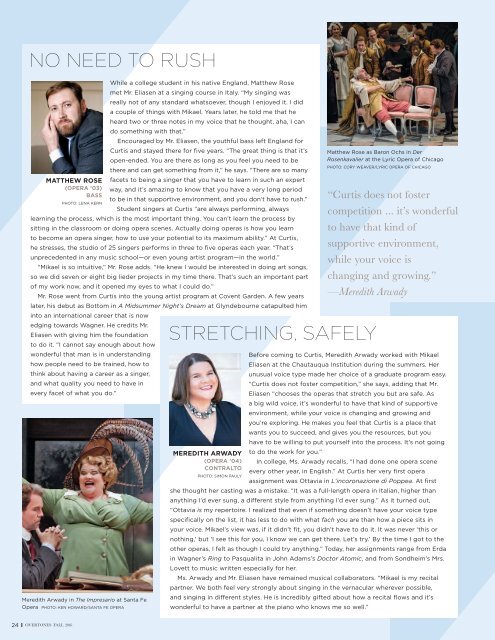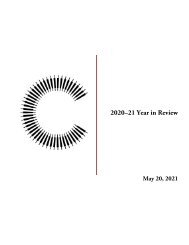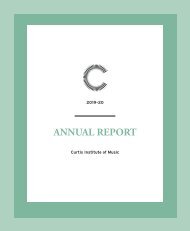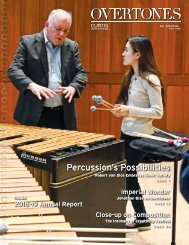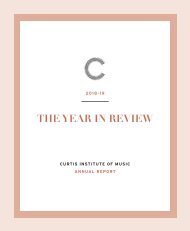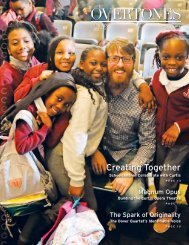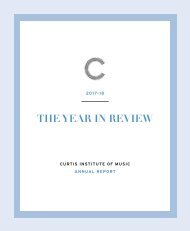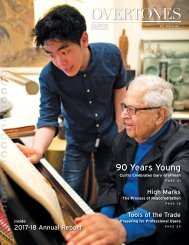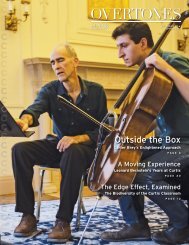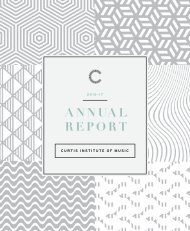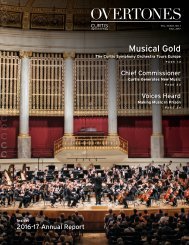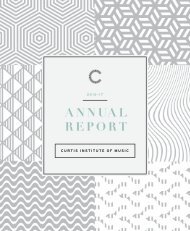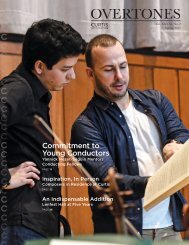Overtones: Fall 2016
Overtones is the semi-annual magazine of the Curtis Institute of Music. In this issue, we celebrate three decades of Mikael Eliasen's tenure, reveal the dynamic history of the Darmstadt school, and more.
Overtones is the semi-annual magazine of the Curtis Institute of Music. In this issue, we celebrate three decades of Mikael Eliasen's tenure, reveal the dynamic history of the Darmstadt school, and more.
You also want an ePaper? Increase the reach of your titles
YUMPU automatically turns print PDFs into web optimized ePapers that Google loves.
NO NEED TO RUSH<br />
While a college student in his native England, Matthew Rose<br />
met Mr. Eliasen at a singing course in Italy. “My singing was<br />
really not of any standard whatsoever, though I enjoyed it. I did<br />
a couple of things with Mikael. Years later, he told me that he<br />
heard two or three notes in my voice that he thought, aha, I can<br />
do something with that.”<br />
Encouraged by Mr. Eliasen, the youthful bass left England for<br />
Curtis and stayed there for five years. “The great thing is that it’s Matthew Rose as Baron Ochs in Der<br />
open-ended. You are there as long as you feel you need to be<br />
rosenkavalier at the Lyric Opera of Chicago<br />
PHOTO: CORY WEAVER/LYRIC OPERA OF CHICAGO<br />
there and can get something from it,” he says. “There are so many<br />
MATTHEW ROSE facets to being a singer that you have to learn in such an expert<br />
(OPERA ’03) way, and it’s amazing to know that you have a very long period<br />
BASS<br />
“Curtis does not foster<br />
to be in that supportive environment, and you don’t have to rush.”<br />
PHOTO: LENA KERN<br />
Student singers at Curtis “are always performing, always<br />
learning the process, which is the most important thing. You can’t learn the process by<br />
sitting in the classroom or doing opera scenes. Actually doing operas is how you learn to have that kind of<br />
to become an opera singer, how to use your potential to its maximum ability.” At Curtis,<br />
supportive environment,<br />
he stresses, the studio of 25 singers performs in three to five operas each year. “That’s<br />
unprecedented in any music school—or even young artist program—in the world.”<br />
while your voice is<br />
“Mikael is so intuitive,” Mr. Rose adds. “He knew I would be interested in doing art songs,<br />
so we did seven or eight big lieder projects in my time there. That’s such an important part changing and growing.”<br />
of my work now, and it opened my eyes to what I could do.”<br />
—Meredith Arwady<br />
Mr. Rose went from Curtis into the young artist program at Covent Garden. A few years<br />
later, his debut as Bottom in A Midsummer night’s Dream at Glyndebourne catapulted him<br />
into an international career that is now<br />
edging towards Wagner. He credits Mr.<br />
Eliasen with giving him the foundation<br />
STRETCHING, SAFELY<br />
to do it. “I cannot say enough about how<br />
wonderful that man is in understanding<br />
Before coming to Curtis, Meredith Arwady worked with Mikael<br />
how people need to be trained, how to<br />
Eliasen at the Chautauqua Institution during the summers. Her<br />
think about having a career as a singer,<br />
unusual voice type made her choice of a graduate program easy.<br />
and what quality you need to have in<br />
“Curtis does not foster competition,” she says, adding that Mr.<br />
every facet of what you do.”<br />
Eliasen “chooses the operas that stretch you but are safe. As<br />
a big wild voice, it’s wonderful to have that kind of supportive<br />
environment, while your voice is changing and growing and<br />
you’re exploring. He makes you feel that Curtis is a place that<br />
wants you to succeed, and gives you the resources, but you<br />
have to be willing to put yourself into the process. It’s not going<br />
MEREDITH ARWADY to do the work for you.”<br />
(OPERA ’04) In college, Ms. Arwady recalls, “I had done one opera scene<br />
CONTRALTO<br />
every other year, in English.” At Curtis her very first opera<br />
PHOTO: SIMON PAULY<br />
assignment was Ottavia in L’incoronazione di Poppea. At first<br />
she thought her casting was a mistake. “It was a full-length opera in Italian, higher than<br />
anything I’d ever sung, a different style from anything I’d ever sung.” As it turned out,<br />
“Ottavia is my repertoire. I realized that even if something doesn’t have your voice type<br />
specifically on the list, it has less to do with what fach you are than how a piece sits in<br />
your voice. Mikael’s view was, if it didn’t fit, you didn’t have to do it. It was never ‘this or<br />
nothing,’ but ‘I see this for you, I know we can get there. Let’s try.’ By the time I got to the<br />
other operas, I felt as though I could try anything.” Today, her assignments range from Erda<br />
in Wagner’s ring to Pasqualita in John Adams’s Doctor Atomic, and from Sondheim’s Mrs.<br />
Lovett to music written especially for her.<br />
Ms. Arwady and Mr. Eliasen have remained musical collaborators. “Mikael is my recital<br />
partner. We both feel very strongly about singing in the vernacular wherever possible,<br />
Meredith Arwady in The Impresario at Santa Fe and singing in different styles. He is incredibly gifted about how a recital flows and it’s<br />
Opera PHOTO: KEN HOWARD/SANTA FE OPERA<br />
wonderful to have a partner at the piano who knows me so well.”<br />
competition ... it’s wonderful<br />
24 OVertONeS <strong>Fall</strong> <strong>2016</strong>


